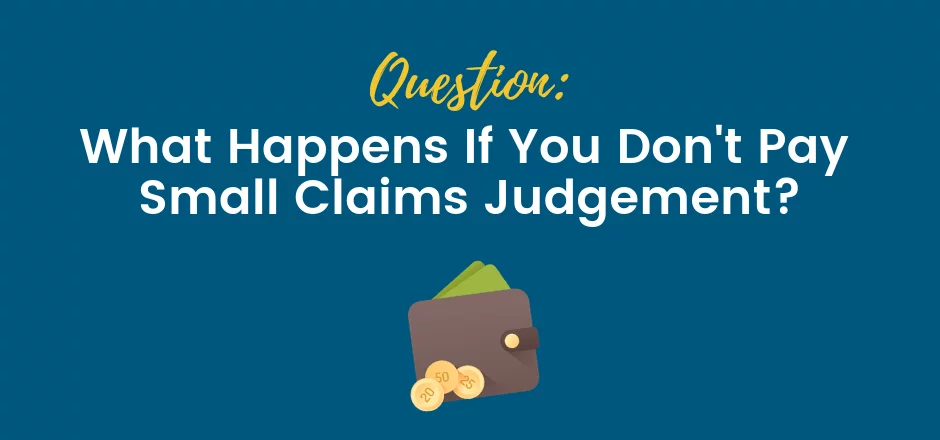What Happens If You Don’t Pay Small Claims Judgement
People go to court for a wide range of reasons in California. If you’re involved in a lawsuit, you may be wondering if you can’t pay. Today, we’re taking a closer look so you’re prepared.
Here’s what happens if you don’t pay small claims judgement.
What Happens If You Don’t Pay Small Claims Judgement
In the State of California, you have the right to sue someone in Small Claims Court if you believe they owe you compensation for damages. This can be very useful for both individuals and businesses who have been directly harmed by someone else’s negligence in a way that causes them to experience loss.
Unfortunately, paying or recovering a judgement is much harder than simply seeking judgement in the first place. Sometimes, debtors lack the funds to pay for assigned judgements. Others simply refuse to pay their judgements out of spite or a failure to accept responsibility.
Whether you are a debtor or a creditor, it is important to understand what happens if you don’t pay small claims judgement. Both parties have options and rights under California state law.
Related: List of things You Can Sue for In California
Terminology
Legal “jargon” can be confusing, especially when it involves California’s courts. To help you better understand this guide, we’ll break down simple terminology first.
In California, the person suing in Small Claims Court is referred to as either the “plaintiff” or the “creditor.” The person defending against the suit is instead referred to as the “defendant” or the “debtor.” There are some situations (especially in cases with counter-suits by the defendant) where the plaintiff and defendant may be both creditor and debtor, although this is much more nuanced.
For the purposes of this article, we’ll refer to the suing party as the “plaintiff” or “debtor,” and the person being sued as the “defendant” or the “debtor.”
“Small claims court” refers to the lowest civil court in California. It allows plaintiffs to sue for between $5000 (for individuals) and $7,500 (for businesses). If you are seeking more than these amounts, you must seek a judgement through the Superior Court of California instead.
Examples of Small Claims Cases
If you hire someone to repair your roof, and they cease contact without actually finishing the job, you can sue to recover any paid-in-advance costs. Similarly, if someone hires and pays you to fix their television, and you break it permanently, they may be able to sue you to recover the cost of the television.
Small Claims court can also be used to recover funds and items in other scenarios, too, such as when a roommate fails to pay their share of the rent or when someone borrows an item from you and fails to return it. The judge will ask both of you to present your version of the facts, weigh the evidence, and then judge whether the plaintiff is due compensation or not.
Businesses can also sue debtors in court to recover the cost of unpaid services or products. For example, if you owe a cellular telephone provider $500, they may sue you in Small Claims court to recover the amount.
What Happens if You Don’t Pay?
Confoundingly, the initial judgement handed down in a Small Claims court case is not a court order. It is not “legally enforceable” in the sense that the courts can force the debtor to pay, nor does it give you the right to seize assets or garnish wages. Instead, the judgement sets a legal precedent that the debtor does, in fact, owe the money, and has been advised of the debt.
Although Small Claims court is designed to help people recover deserved compensation for negligence, it isn’t always easy to force defendants to pay. As a defendant, it can also be difficult to meet the demands of the court if you are experiencing hardship.
Typically, the courts will first ask the plaintiff to work with the defendant or debtor on a payment plan or arrangement. This is often enough for many debtors, empowering them to repay the debt without filing bankruptcy in the process. It is in the creditor’s best interest to work with the debtor for this reason.
If the defendant still refuses to pay, or if they cannot be located, the plaintiff can go back to the courts and request an order to pay with garnishment. Alternatively, if the defendant is unable to pay, they may ask for an examination hearing instead.
Wage Garnishment
A wage garnishment order gives either the Small Claims court or the creditor the right to seize money directly from sources of income and monetary assets. For example, the courts may garnish wages directly from the debtor’s paycheck, employer, savings account, checking account, or pension to pay the creditor. The creditor can also take the order of garnishment to the debtor’s bank or employer and demand garnishment directly or via a lawyer without channeling payments through the courts.
Wage garnishment is a last resort for creditors when the courts verify the defendant has the ability to pay, yet simply refuses to settle the debt. It is rarely used in situations where the defendant is on government benefits (SSA), lacks an income, or can otherwise clearly demonstrate extreme financial hardship. This is where examination hearings come in.
Debtor’s Examination Hearings
If the defendant or debtor feels they cannot afford to pay their small claims judgement, either they or the creditor can request a debtor’s examination. This is a formal court proceeding in which the courts identify the debtor’s assets, income, associated businesses, investments, bonds, savings accounts, or personal and real property (such as a car or home).
First, the creditor must fill out two forms:
- Application and Order to Produce Statement of Assets and to Appear for Examination (Form SC-134)
- Small Claims Subpoena for Personal Appearance and Production of Documents at Trial or Hearing and Declaration (Form SC-107)
After the forms are filled out, the credit must submit them with a copy of the original judgment, to the courts. Then, they must have the debtor served with a notice to appear at least 10 days prior to the court date via a sheriff or registered process server. If this option is chosen, and the debtor does not show up for the hearing, the courts will release a bench warrant to have them arrested and brought to court.
At the hearing, the courts will review the debtor’s assets, the location of their assets, and their ability to pay. They will also ask the debtor to explain why they haven’t paid, including whether or not they are experiencing special hardship (such as a sick child, terminal illness, or disability that makes them unable to work).
Results of the Debtor’s Examination
If the court judges that the debtor does not have the ability to pay, they may recommend discharging the debt. However, they cannot compel the creditor to discharge the debt – that’s up to the individual creditor.
If the court judges that the debtor can pay, or if they identify hidden assets and/or clear proof the individual has been actively avoiding payment, the creditor should again attempt to work with them to have the debt paid.
If the debtor’s examination identifies seizable monetary or real property assets (like vehicles and electronics), creditors can ask the court for permission to seize them. This may be through garnishment, by putting a lien on property, or by having real property sold at auction through the courts.
It is relatively easy to have small real property items like vehicles, safety deposit boxes, and stocks or bonds seized for Small Claims court cases. However, it is important to note the maximum a creditor can sue for in the Small Claims court is much, much smaller than the worth of most vehicles and/or houses, which can complicate approval via the courts. It is extremely rare for a creditor to put a lien on a home or have it sold at auction over a debt under $7,500.
Conclusion
Now that you know what happens if you don’t pay small claims judgement, you know what to expect if you decide not to pay.
Ultimately, Small Claims court cases can be much more complicated than they seem at first glance. Few creditors or plaintiffs have the experience and knowledge to ensure a win, especially if the case isn’t clear-cut. It’s best to work with a lawyer on at least a consultation basis to ensure your rights as a creditor or debtor are protected.
Are you in search for a certified attorney to represent you?
Let us help you find one today!




